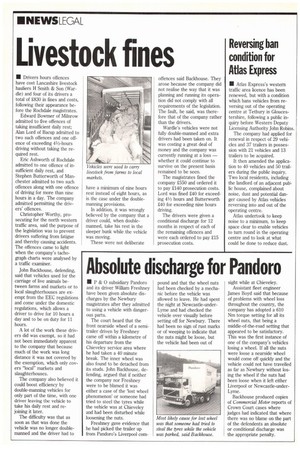Livestock fines
Page 22

If you've noticed an error in this article please click here to report it so we can fix it.
• Drivers hours offences have cost Lancashire livestock hauliers H Smith & Son (Wardle) and four of its drivers a total of 2830 in fines and costs, following their appearance before the Rochdale magistrates.
Edward Bowmer of Milnrow admitted to five offences of taking insufficient daily rest; Alan Lord of Bacup admitted to two such offences and one offence of exceeding 41/2-hours driving without taking the required rest.
Eric Ashworth of Rochdale admitted to one offence of insufficient daily rest, and Stephen Butterworth of Manchester admitted to two such offences along with one offence of driving for more than nine hours in a day. The company admitted permitting the drivers' offences.
Christopher Worthy, prosecuting for the north western traffic area, said the purpose of the legislation was to prevent drivers suffering from fatigue and thereby causing accidents. The offences came to light when the company's tachograph charts were analysed by a traffic examiner.
John Backhouse, defending, said that vehicles used for the carriage of live animals between farms and markets or to local slaughterhouses are exempt from the EEC regulations and come under the domestic regulations, which allows a driver to drive for 10 hours a day and to be on duty for 11 hours.
A lot of the work these drivers did was exempt, so it had not been immediately apparent to the company that because much of the work was long distance it was not covered by the exemption, which only covers "local" markets and slaughterhouses.
The company also believed it could boost efficiency by double-manning vehicles for only part of the time, with one driver leaving the vehicle to take his daily rest and rejoining it later.
The difficulty was that as soon as that was done the vehicle was no longer doublemanned and the driver had to have a minimum of nine hours rest instead of eight hours, as is the case under the doublemanning provisions.
In addition, it was wrongly believed by the company that a driver could, when doublemanned, take his rest in the sleeper bunk while the vehicle was moving.
These were not deliberate offences said Backhouse. They arose because the company did not realise the way that it was planning and running its operation did not comply with all requirements of the legislation. The fault, he said, was therefore that of the company rather than the drivers.
Wardle's vehicles were not fully double-manned and extra drivers had been taken on. It was costing a great deal of money and the company was currently running at a loss — whether it could continue to survive on the present basis remained to be seen.
The magistrates fined the company 2550 and ordered it to pay £140 prosecution costs. Lord was fined 240 for exceeding 41/2 hours and Butterworth 240 for exceeding nine hours driving.
The drivers were given a conditional discharge for 12 months in respect of each of the remaining offences and were each ordered to pay 215 prosecution costs.












































































































































































